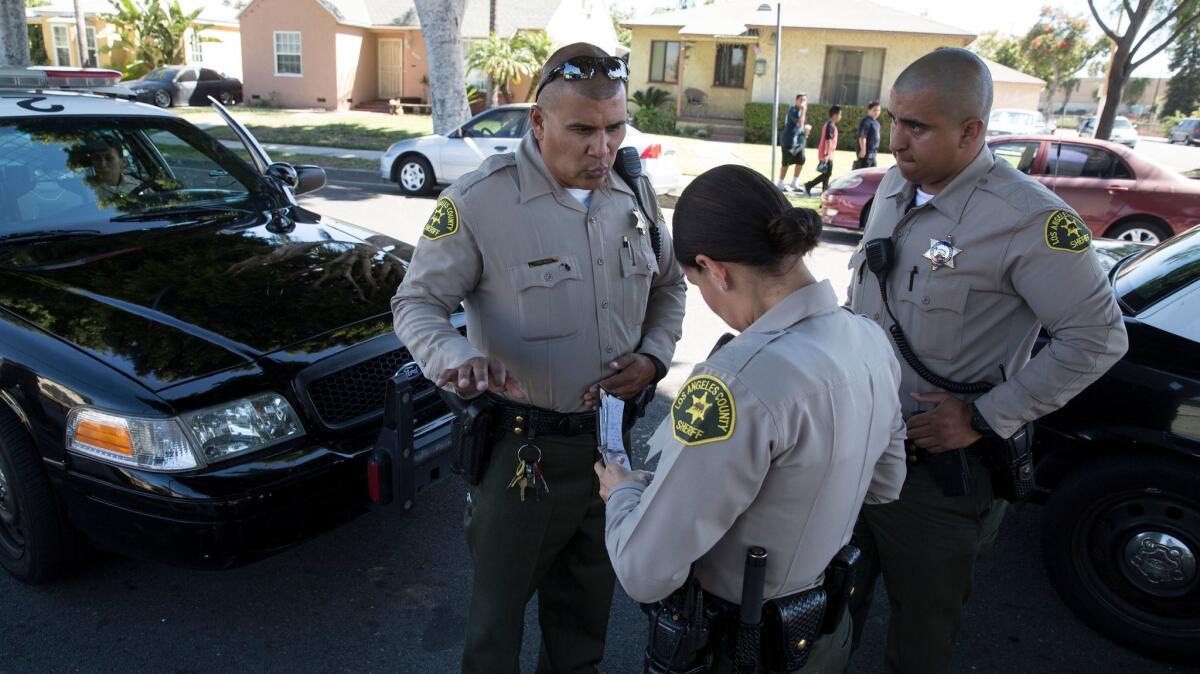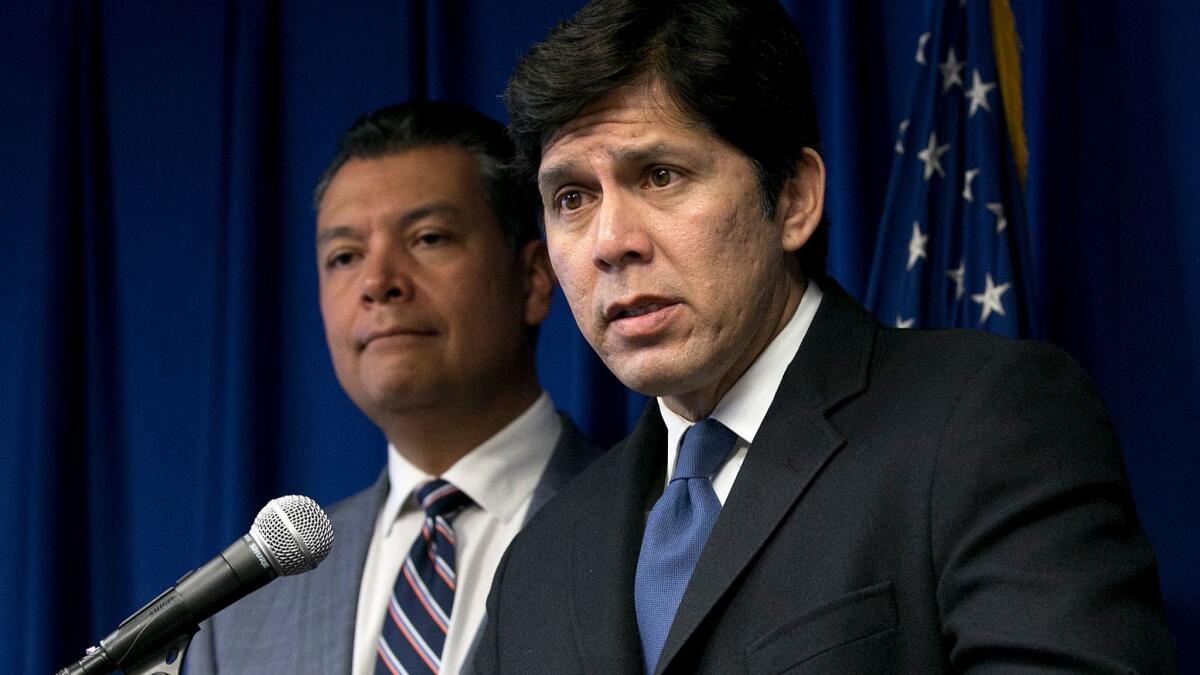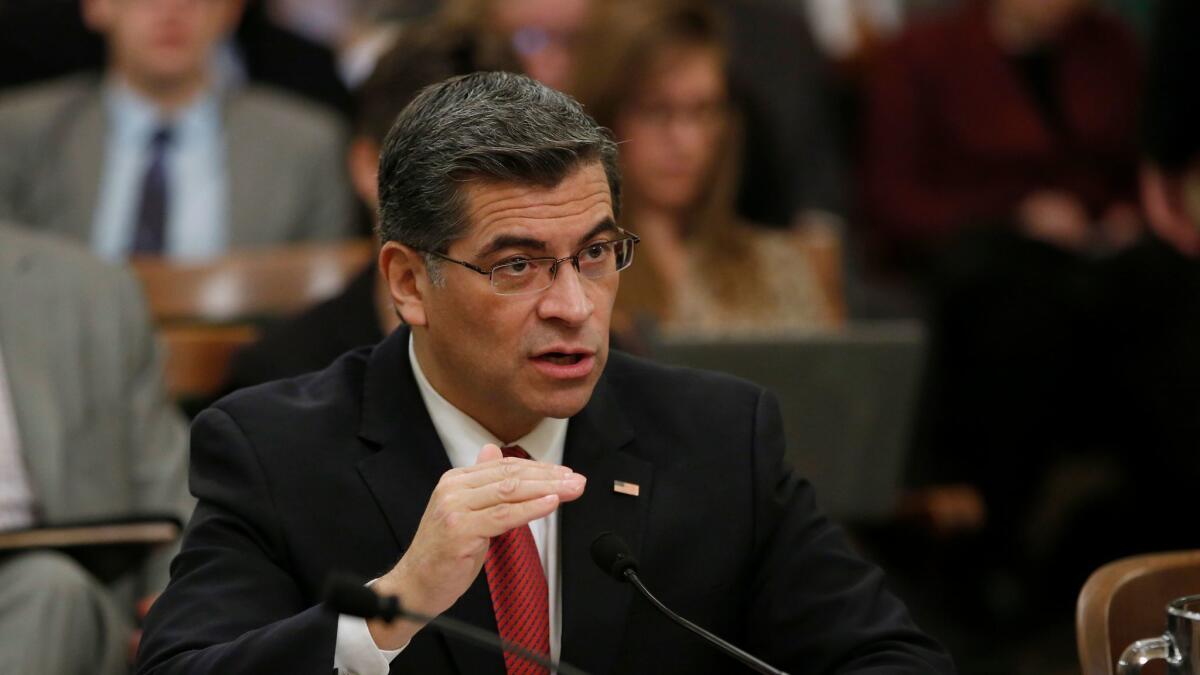California lawmakers passed the ‘sanctuary state’ bill. What happens if Gov. Jerry Brown signs it?

- Share via
In a strike at
Senate Bill 54, approved on the last day of the 2017 legislative session, would limit whom state and local law enforcement officers can hold and question on immigration violations. It’s now on Gov.
Here’s what’s next if Brown signs it:
The law could land in court
The law would take effect in January, but Trump administration officials could challenge its provisions and even try to block it from being implemented.
U.S. Atty. Gen. Jeff Sessions, who has called SB 54 “unconscionable,” is already locked in a legal battle with several cities, including San Francisco, over his move to withhold Justice Department grant funds to discourage “sanctuary city” policies. On the day California lawmakers voted to pass SB 54, a federal judge in Chicago largely blocked his measure.
State senate leader Kevin de León (D-Los Angeles), who introduced the legislation, has said state leaders are prepared to defend it in court. Some legal experts say an effort to block California’s law would likely be unsuccessful, pointing to the 10th Amendment and previous rulings in which courts have found the federal government can't compel local authorities to enforce federal laws.
If it takes effect, there would be new limits on law enforcement
Dubbed the “California Values Act,” Senate Bill 54 would establish clear divisions between law enforcement and federal immigration authorities in an attempt to ensure local officers do not become part of deportation efforts under the Trump administration.
The law would largely prohibit state and local law enforcement agencies, including school and security officers, from using money or staff to investigate, question, hold or arrest people for immigration violations.
For many officers across the state, the expanded restrictions wouldn’t change much. Some police and sheriff agencies have already developed similar boundaries against working with immigration agents through their own policies or under local “sanctuary city” rules that limit collaboration between local agencies and federal immigration authorities. For other officers, the legislation would set new guidelines.
Agencies would be barred from:
With some exceptions
- providing information regarding an inmate’s release date from county jail unless that information is available to the public, or the person has been convicted of certain crimes
- transferring someone to ICE unless a judge finds probable cause or issues a warrant, or if the person has certain prior convictions
- contracting with the federal government to house federal detainees, unless specified in current law

All offenders would not be protected
Under the law, state and local agencies would not be able to detain immigrants for U.S. Immigration and Customs Enforcement based on “hold” requests, something many departments already stopped doing after a 2014 court ruling.
But the electronic fingerprint records for all offenders booked into state prisons and local jails would continue going to the FBI and the Department of Homeland Security.
Police and sheriffs would also be able to continue sharing inmates’ release dates and transferring people to immigration authorities if they have been convicted within the last 15 years of one of roughly 800 offenses outlined in the Trust Act. That California law prohibits state and local law enforcement from holding people past their release dates for federal immigration agents unless they’ve been convicted of certain crimes.
Those include all serious and violent crimes, registered sex and arson offenses, domestic violence charges and other felonies. They also cover many nonviolent offenses and “wobblers” — crimes that can be charged as either a felony or misdemeanor.
But SB 54 did narrow the list: All seven drug and theft crimes reduced to misdemeanors under Proposition 47, which voters approved in 2014, would no longer be among those crimes.
‘Safe zones’ would be created
Other provisions in the bill were crafted to counter a chilling effect in immigrant communities, where some crime witnesses and victims have stopped coming forward to authorities out of fear of deportation.
Under the law, the state attorney general would have to publish policies by October 2018 to limit immigration enforcement at courthouses, public schools and libraries and health facilities run by state or local governments.
All other government-run organizations that offer physical or mental health and wellness services, or thatprovide access to education, legal aid and social services — including the University of California — would be encouraged but not required to adopt the state policies.
There would be more oversight and accountability
The state attorney general’s office would have to publish guidelines and training recommendations in order to limit immigration agents' access to personal information, and all law enforcement agencies would have to send the office annual reports on the people they transfer to immigration authorities.
Law enforcement officials would still be able to participate in multi-agency joint task forces responsible for broad investigations, which sometimes include ICE criminal investigators. But their primary purpose could not be to enforce immigration laws, and they would have to submit annual reports to the attorney general on their activities, such as the types and frequency of arrests.
By March 2019, the state attorney general would have to publish an annual report on its website abouton the types of joint task forces operating across the state, an effort to give the public more insight into how many people without legal status they are detaining or questioning as part of those broader criminal investigations.
Prison policies would change
The California Department of Corrections and Rehabilitation would be exempt from all provisions in the bill.
But corrections officials would have to develop new standards to protect people held on immigration violations, and allow immigrant inmates to get credits toward their sentences if they join rehabilitation and educational programs.
State prison officials also would have to inform inmates if ICE has requested they be held or transferred, and provide them with written consent forms before any interview with immigration agents on civil immigration violations.
Some things would stay the same
As long as they don’t violate existing city or county laws, any California law enforcement agency could continue:
- arresting or charging people for illegal reentry if a person has previously been deported and been convicted of aggravated felony
- providing ICE with information about a person’s criminal record
- asking questions to determine whether a person is eligible for temporary legal status for victims of human trafficking or violent crime
- asking questions to determine if someone has violated federal laws on the sale of firearms to people without U.S. citizenship
- allowing immigration agents to interview people inside county jails or state prisons

The attorney general would enforce it
The legislation doesn’t specify what happens if law enforcement agencies don’t comply with the law. But the attorney general has broad authority under the California constitution to prosecute police and sheriffs agencies that don’t follow SB 54’s provisions should it be signed into law.
ALSO:
California lawmakers approve landmark 'sanctuary state' bill to expand protections for immigrants
How California's Trust Act shaped the debate on the new 'sanctuary state' proposal
Get the L.A. Times Politics newsletter
Deeply reported insights into legislation, politics and policy from Sacramento, Washington and beyond. In your inbox three times per week.
You may occasionally receive promotional content from the Los Angeles Times.








